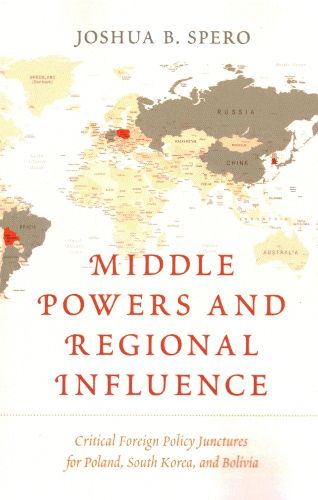Readings Newsletter
Become a Readings Member to make your shopping experience even easier.
Sign in or sign up for free!
You’re not far away from qualifying for FREE standard shipping within Australia
You’ve qualified for FREE standard shipping within Australia
The cart is loading…






In the growing literature on middle powers, this book contributes by expanding case study analysis and extending international relations theory in its application to foreign policy decisions. Thus, this book builds on prominent middle power literature and aims to advance our theoretical understanding for why crucial foreign policies were made by the pivotal middle powers this book examines-Poland, South Korea, and Bolivia.
For this book’s three case studies and their first-term leadership’s critical junctures-from first term post-communist Poland, post-authoritarian/post-ruling party South Korea, and post-colonial Bolivia-we have the antecedents for contemporary middle powers essential for realizing the regional evolution for cooperative change with greater powers systemically; we may then grasp today why those historical foreign policies, albeit not so long ago, give us crucial antecedents for adapting and trying, yet again, to resolve seemingly perennial power dilemmas regionally, peacefully.
Here are why middle power impact matters, not only regionally for stronger, dominant greater power neighbours, but also for transformative middle power leaderships which proved pivotal geopolitically for their region’s challenges and changes.
$9.00 standard shipping within Australia
FREE standard shipping within Australia for orders over $100.00
Express & International shipping calculated at checkout
In the growing literature on middle powers, this book contributes by expanding case study analysis and extending international relations theory in its application to foreign policy decisions. Thus, this book builds on prominent middle power literature and aims to advance our theoretical understanding for why crucial foreign policies were made by the pivotal middle powers this book examines-Poland, South Korea, and Bolivia.
For this book’s three case studies and their first-term leadership’s critical junctures-from first term post-communist Poland, post-authoritarian/post-ruling party South Korea, and post-colonial Bolivia-we have the antecedents for contemporary middle powers essential for realizing the regional evolution for cooperative change with greater powers systemically; we may then grasp today why those historical foreign policies, albeit not so long ago, give us crucial antecedents for adapting and trying, yet again, to resolve seemingly perennial power dilemmas regionally, peacefully.
Here are why middle power impact matters, not only regionally for stronger, dominant greater power neighbours, but also for transformative middle power leaderships which proved pivotal geopolitically for their region’s challenges and changes.